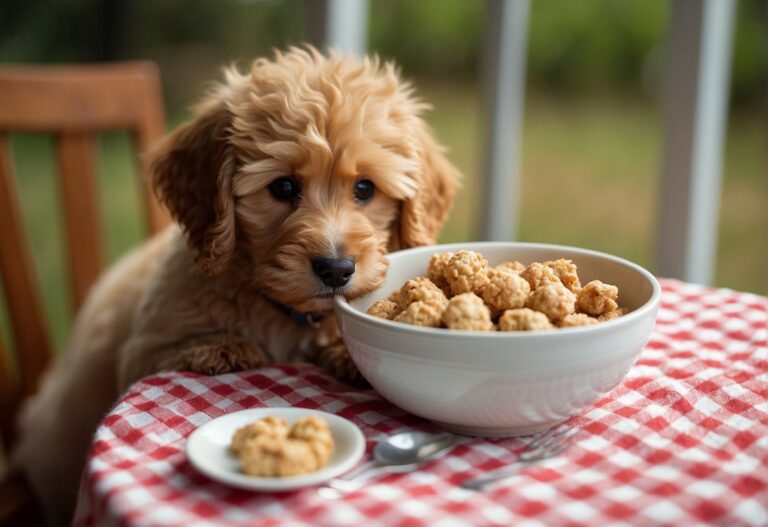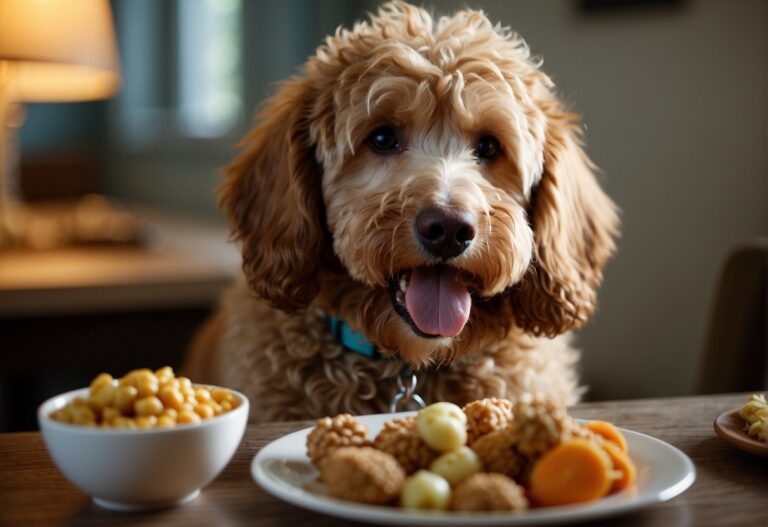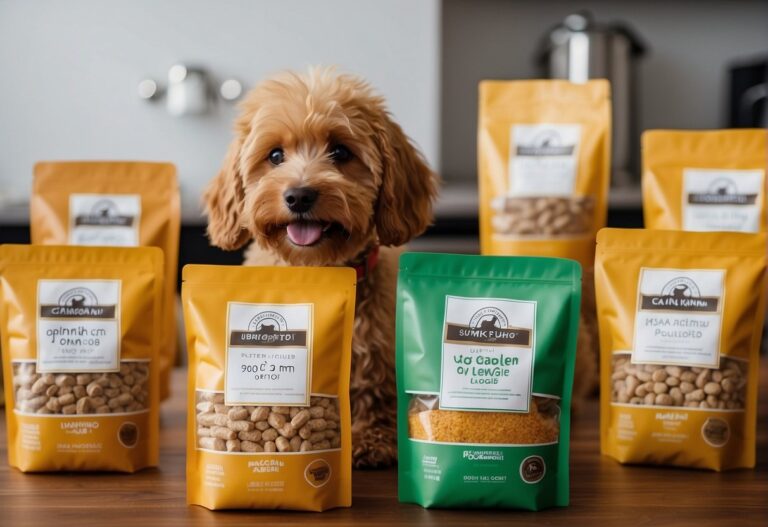Why Your Goldendoodle Won’t Eat: Top Fixes and Causes Explained

If you’re a Goldendoodle owner, you know how important it is to keep your furry friend healthy and happy. One of the most concerning issues that you may face with your Goldendoodle Won’t Eat or when they stop eating. Loss of appetite in dogs can be caused by various factors, including health issues, behavioural problems, and even environmental changes.
If your Goldendoodle won’t eat, it can be a frustrating and worrying experience, but there are steps you can take to help them regain their appetite.
Understanding Your Goldendoodle’s Eating Habits is crucial to addressing the problem of loss of appetite. Goldendoodles are known to be picky eaters, and they may refuse to eat if they don’t like the taste of their food or if they’re bored with their diet.
Therefore, it’s essential to provide them with a balanced and nutritious diet that meets their dietary needs and preferences. In addition, you should establish a consistent feeding schedule and avoid overfeeding them with treats or table scraps.
Health and Nutrition Factors can also play a significant role in your Goldendoodle’s appetite. If your Goldendoodle has stopped eating suddenly, it could be a sign of an underlying health issue.
In this case, you should take them to the vet for a checkup to rule out any medical problems. Furthermore, you should ensure that your Goldendoodle is getting enough water, as dehydration can lead to loss of appetite in dogs.
- Understanding your Goldendoodle’s eating habits is crucial to addressing loss of appetite.
- Health and nutrition factors can play a significant role in your Goldendoodle’s appetite.
- It’s essential to establish a consistent feeding schedule and avoid overfeeding your Goldendoodle with treats or table scraps.
Goldendoodle’s Eating Habits: Why Goldendoodle Won’t Eat?
Goldendoodles are known to be intelligent and playful dogs. However, they can be finicky eaters at times. Understanding your Goldendoodle’s eating habits is crucial to ensure they are healthy and happy. In this section, we will discuss some factors that can affect your Goldendoodle’s appetite.
Identifying Normal Behavior vs. Picky Eating
It is essential to differentiate between normal eating behaviour and picky eating. Picky eating is when your Goldendoodle is reluctant to eat its food or only eats certain types of food.
Normal eating behaviour includes eating their food quickly or slowly, taking breaks during meals, and drinking water before or after eating.
If your Goldendoodle is a picky eater, it is best to consult with a vet to rule out any underlying medical conditions. Once medical issues are ruled out, you can try different types of food or feeding methods to determine what works best for your dog.
The Impact of Routine and Environment on Appetite
Your Goldendoodle’s routine and environment can significantly impact their appetite. Dogs thrive on routine, and feeding them at the same time every day can help them develop healthy eating habits.
Additionally, feeding your Goldendoodle in a quiet and calm environment can help them focus on their food and reduce stress.
On the other hand, a change in routine or environment can cause your Goldendoodle to lose its appetite. For example, a new home, a new family member, or a schedule change can all affect your Goldendoodle’s eating habits.
In such cases, it is best to give them time to adjust to the change and offer them their food at the same time and in the same location as before.
Size and Age Considerations: Puppy vs. Adult Food
Goldendoodles come in different sizes, and their age can also affect their eating habits.
Puppies require more calories and nutrients than adult dogs to support their growth and development. Therefore, feeding them puppy food that is specially formulated for their nutritional needs is essential.
As your Goldendoodle grows older, their caloric and nutritional needs change. Adult food is formulated to meet the needs of adult dogs and should be introduced gradually to prevent digestive upset.
Additionally, it is essential to monitor your Goldendoodle’s weight and adjust their food intake accordingly to prevent obesity.
Goldendoodle Won’t Eat: Health and Nutrition Factors to Consider
Ensuring your Goldendoodle is healthy and consuming a balanced diet is essential for their overall well-being. There are several factors to consider when it comes to your Goldendoodle’s health and nutrition.
Recognizing Symptoms of Health Problems
It’s important to be aware of any health problems that your Goldendoodle may be experiencing. Some common health issues that Goldendoodles may face include hip dysplasia, ear infections, and heart conditions.
If your Goldendoodle is experiencing any symptoms such as wobbliness, pain, or weakness in the hind legs, or reluctance to climb stairs or run around, it may be a sign of hip dysplasia.
Similarly, if your Goldendoodle is shaking its head or scratching its ears excessively, it may be a sign of an ear infection.
If you notice any of these symptoms, it’s important to take your Goldendoodle to the vet for a check-up.
Dietary Needs and Nutritional Balance
Your Goldendoodle’s dietary needs may vary depending on their age, weight, and activity level.
It’s important to ensure that your Goldendoodle is consuming a balanced diet that includes protein, fat, fibre, and other essential nutrients.
Fresh, healthy food choices such as turkey, chicken, beef, vegetables, and fruits can provide your Goldendoodle with the necessary nutritional benefits. Additionally, supplements can be added to your Goldendoodle’s diet to ensure they are getting the nutrients they need.
Read More: How Much to Feed a Goldendoodle Puppy: Essential Diet Guide
Appropriate Food Choices and Alternatives
When choosing food for your Goldendoodle, make sure to select appropriate dog food brands that provide the necessary nutritional balance.
Kibble is a popular and convenient option for Goldendoodle owners, but it’s important to choose a high-quality, grain-free dog food that is appropriate for your Goldendoodle’s age and weight.
Dry dog kibble is usually the best to feed your Goldendoodle. Additionally, fresh food choices such as cooked chicken, eggs, Brussels sprouts, and even olives can be a great way to spice up your Goldendoodle’s diet and keep the tummy rumbles at bay between meals.
Behavioural and Psychological Aspects
Goldendoodles are generally happy and friendly dogs that love to eat. However, there may be times when your furry friend refuses to eat. In some cases, this may be due to behavioural or psychological factors. Understanding these factors can help you address the issue and get your Goldendoodle back to its normal eating habits.
Stress and Anxiety as Factors in Appetite Loss
Like humans, dogs can experience stress and anxiety. These emotions can affect their appetite and cause them to lose interest in food.
Stress and anxiety can be caused by a variety of factors, such as changes in routine, new environments, or loud noises.
If you suspect that stress or anxiety is causing your Goldendoodle’s appetite loss, try to identify the source of stress and remove it.
You can also try to create a calm and relaxing environment for your dog. This can include playing soft music or providing a comfortable bed.
The Role of Mental and Physical Stimulation
Goldendoodles are intelligent dogs that require mental and physical stimulation. Lack of stimulation can lead to boredom, which can cause your dog to lose interest in food.
It’s important to provide your Goldendoodle with plenty of activity and mental stimulation. This can include regular exercise, training, and new activities.
Frozen treats can also provide mental stimulation and encourage your dog to eat.
If your Goldendoodle is not getting enough stimulation, try to increase its activity level and provide more mental stimulation. This can help stimulate their appetite and encourage them to eat.
When to Seek Professional Help
If your Goldendoodle is refusing to eat for more than 24 hours, it is time to seek professional help. There are several reasons why your dog may not be eating, including symptoms of vomiting, diarrhoea, or other illnesses.
How to Identify Serious Health Issues When Your Goldendoodle Won’t Eat
Several health issues can cause your Goldendoodle to stop eating. These include patellar luxation, hip dysplasia, and cataracts, among others.
If your dog is experiencing any of these issues, they may require treatment from a veterinarian.
Additionally, if your Goldendoodle is experiencing symptoms of bloat, such as an upset stomach or excessive drooling, it is important to seek medical attention immediately.
Consulting with a Veterinarian for Treatment and Advice
If your Goldendoodle is not eating, it is important to consult with a veterinarian for treatment and advice.
A veterinarian can help you identify the underlying cause of your dog’s refusal to eat, as well as provide treatment options to help your dog feel better.
In some cases, your veterinarian may recommend a change in diet or medication to help your Goldendoodle regain its appetite.
In addition to providing treatment for health issues, a veterinarian can also help you identify any underlying behavioural issues that may be contributing to your Goldendoodle’s refusal to eat.
For example, if your dog is experiencing separation anxiety, they may refuse to eat when left alone.
Read More: How to Crate Training Mini Goldendoodle Puppies
A veterinarian can help you develop a plan to address these behavioural issues and help your dog feel more comfortable and secure.
Frequently Asked Questions
How can I encourage my picky Goldendoodle to eat?
If your Goldendoodle is a picky eater, there are a few things you can try to encourage them to eat. First, make sure you are feeding them at the same time every day and sticking to a consistent feeding schedule.
You can also try adding a small amount of wet food or mixing in some cooked chicken or vegetables to make their meal more appealing. Another option is to try a different brand or flavour of dog food to see if that makes a difference.
What are the best food options for a Goldendoodle with a sensitive stomach?
If your Goldendoodle has a sensitive stomach, it’s important to choose a high-quality dog food that is easy to digest. Look for food that contains simple, whole-food ingredients and avoid artificial preservatives, colours, and flavours.
You may also want to consider a limited-ingredient diet or a grain-free diet to help reduce the risk of food sensitivities.
How often should I be feeding my Goldendoodle to ensure proper nutrition?
The frequency of feeding your Goldendoodle depends on their age, activity level, and overall health. Puppies should be fed more frequently, up to three or four times a day, while adult dogs can typically be fed twice a day.
It’s important to follow the feeding guidelines on your dog’s food packaging and adjust as necessary based on your dog’s individual needs.
What should I do if my Goldendoodle has suddenly lost its appetite?
If your Goldendoodle has suddenly lost its appetite, it’s important to monitor them closely. Contact your veterinarian if the problem persists. Loss of appetite can be a sign of an underlying health issue.
So, you need to rule out any serious conditions. In the meantime, you can try offering small, frequent meals. You can also add some wet food or cooked chicken to their meals to make them more appealing.
Can a Goldendoodle’s eating habits indicate underlying health issues?
Yes, a Goldendoodle’s eating habits can be an indicator of underlying health issues. If your dog is suddenly eating less or not eating at all, it could be a sign of an illness or other health problem.
It’s important to monitor your dog’s eating habits and contact your veterinarian if you notice any changes or abnormalities.
What are the signs of food sensitivities in Goldendoodles?
Signs of food sensitivities in Goldendoodles can include vomiting, diarrhoea, skin rashes, and itching. If you suspect your dog has food sensitivity, switch to a limited-ingredient diet or a grain-free diet.
Then, monitor their symptoms closely. If the problem persists, contact your veterinarian for further guidance.






